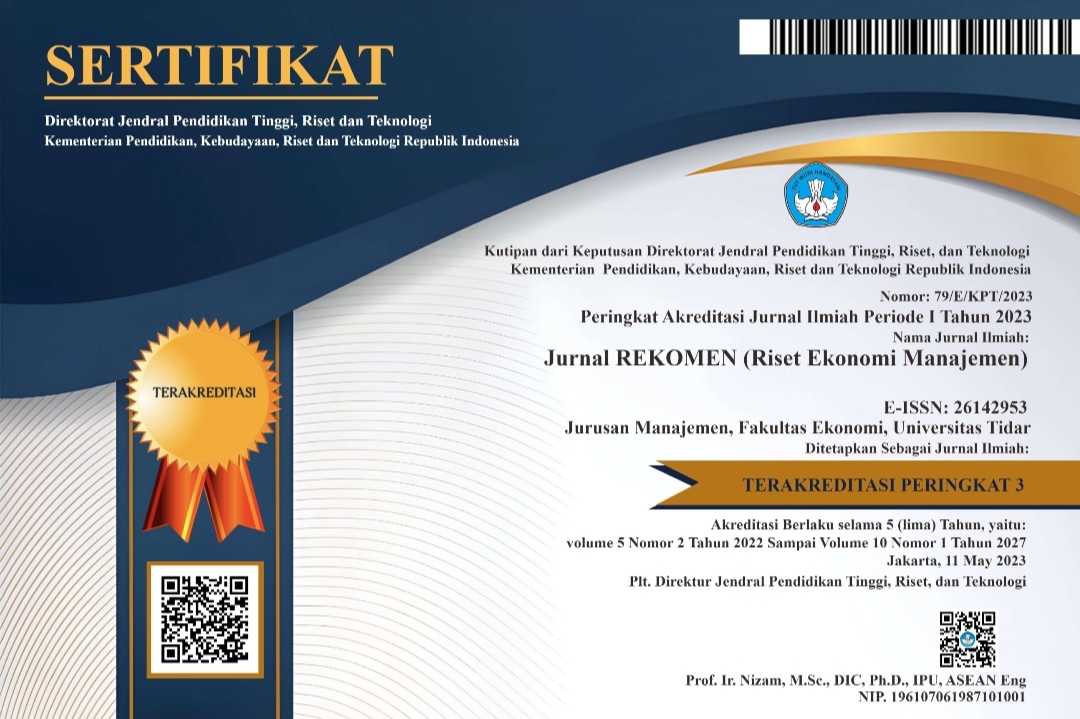Analysis Of The Influence Of Financial Literature, Lifestyle, Emotional Intelligence, And Financial Technology Development On The Financial Behavior Of Yogyakarta’s Millenials Generation During The Covid-19 Pandemic
DOI:
https://doi.org/10.31002/rekomen.v6i1.354Keywords:
Financial Literature, Lifestyle, Emotional Intelligence, Financial Technology Development, Financial BehaviorAbstract
This study is to examine the relationship between financial behavior of millennial generation during the COVID-19 pandemic which was influenced by factors such as financial literacy, lifestyle, emotional intelligence and the development of financial technology. The existence of the COVID-19 pandemic for the millennial generation certainly affects their financial behavior. The ability that has not been maximized in self-control, namely not being able to be wise in using money, not being able to control oneself when hanging out with other people and not being able to wisely face the changing times, indicates that the millennial generation still has low emotional intelligence. The results of this study were carried out descriptively or through descriptions that described and explained the research subject. Then for the approach in this research follow the steps of quantitative research work. The sample used in this study was 100 Millennials in Yogyakarta. The research variable data was processed using the Software Statistical Product and Service Solution (SPSS) version 22. The analytical methods used included descriptive statistical analysis, multiple linear regression analysis, and hypothesis testing. Financial literacy, lifestyle, emotional intelligence, and the development of fintech have a significant positive effect on the financial behavior. Financial literacy has a significant positive effect on the financial behavior. Lifestyle has a significant positive effect on the financial behavior. Emotional intelligence has a significant positive effect on the financial behavior. The development of financial technology has a significant positive effect on the financial behavior.
References
AA. Anwar Prabu Mangkunegara. 2014. Manajemen Sumber Daya Manusia Perusahaan, Bandung: PT. Remaja Rosdakarya.
Ajzen, Icek. 2005. Attitudes, Personality and Behaviour 2nd edition, Open University Press, Berkshire and New York.
Azizah, Nurul Safura. 2020. Pengaruh literasi keuangan, gaya hidup pada perilaku keuangan pada generasi milenial. Prisma (Platform Riset Mahasiswa Akuntansi), 1(2), 92.101
Delyana Rahmawany Pulungan., Murviana Koto., Lena Syahfitri. 2018. Pengaruh Gaya Hidup Hedonis dan Kecerdasan Emosional terhadap Perilaku Keuangan Mahasiswa. Jurnal Stmikroyal.
Dorfleitner, Hornuf, Schmitt, & Weber. 2017, from CourseHero: https://www.coursehero.com/
Elliehausen, Gregory. E Lundquist Christopher, S. M. E. 2007. The Impact of Credit Counseling on Subsequent Borrower Behavior. Journal of Consumer Affairs, 41(1), 1–28.
Farida, Mamik Nur; Soesatyo, Yoyok; Aji, Tony Seno. 2021. Influence of Financial Literacy and Use of Financial Technology on Financial Satisfaction through Financial Behavior. International Journal of Education and Literacy Studies, 9(1), 86-95
Ferdiansyah, Aditya., Triwahyuningtyas, Nunuk. 2021. Analisis Layanan Financial Technology Terhadap Perilaku Keuangan Mahasiswa. Jurnal Ilmiah Mahasiswa Ekonomi Manajemen, 6(1).
Ghozali, I., 2018. Aplikasi Analisis Multivariate dengan Program IBM SPSS 25, Badan Penerbit Universitas Diponegoro, Semarang.
Ghozali, I., Latan, H., 2017. Partial Least Square: Konsep, Teknik, dan Aplikasi Menggunakan Program SmartPLS 3.0, Badan Penerbit Universitas Diponegoro, Semarang.
Ghufron, M. dan Risnawati, N.R. 2014. Teori - Teori Psikologi. Yogyakarta: ArRuzz Media.
Goleman, D. 2016. Emotional Intelligence: Kecerdasan Emosional (Alih Bahasa: T. Hermaya). Jakarta: PT Gramedia Pustaka Utama.
Hendro Wiyono, Kusuma Chandra Kirana. 2021. Digital Transformation of SMEs Financial Behavior in the New Normal Era.
Hilgert, M.A., Hogart, J.M., & Berly, S.G., 2003. Household financial management: the connection between knowledge and behavior, Federal Reserve Bulletin, 89, 309-322
Hsueh. 2017. from https://www.coursehero.com/
Kusnandar, D. L., & Kurniawan, D. 2020. Literasi Keuangan Dan Gaya Hidup Ibu Rumah Tangga Dalam Membentuk Perilaku Keuangan Di Tasikmalaya. Sains: Jurnal Manajemen Dan Bisnis, 13(1), 123–143. https://doi.org/10.35448/jmb.v13i1.7920
Nurul Safura Azizah. 2020. Pengaruh Literasi Keuangan, Gaya Hidup Pada Perilaku Keuangan Pada Generasi Milenial. Prisma (Platform Riset Mahasiswa Akuntansi), 1(2), 92-101. https://ojs.stiesa.ac.id/index.php/prisma
Pribadiono, Hukum, Esa, & Barat. 2016. Retrieved from Coursehero: https://www.coursehero.com/
Rahayu, R., Ali, S., & Hidayah., R. 2022. Literasi Keuangan Digital Saat Ini dan Perilaku Keuangan Milenial Indonesia. Jurnal Akuntansi dan Investasi, JIL. 23(1) Januari 2022.
Sekaran, Uma & Roger Bougie, 2017, Metode Penelitian untuk Bisnis: Pendekatan Pengembangan-Keahlian, Edisi 6, Buku 1, Salemba Empat, Jakarta Selatan 12610.
Sekaran, Uma & Roger Bougie, 2017. Metode Penelitian untuk Bisnis: Pendekatan Pengembangan-Keahlian, Edisi 6, Buku 2, Salemba Empat, Jakarta Selatan 12610.
Sugiyono, 2020. Metode Penelitian Kualitatif. Bandung: Alfabeta
Ulfy Safryani., Alfida Aziz., Nunuk Triwahyuningtyas. 2020. Analisis Literasi Keuangan, Perilaku Keuangan, Dan Pendapatan Terhadap Keputusan Investasi. Jurnal Ilmiah Akuntansi Kesatuan, 8(3), 319-332. https://doi.org/10.37641/jiakes.v8i3.384
Downloads
Published
Issue
Section
License
Copyright (c) 2023 Jurnal REKOMEN (Riset Ekonomi Manajemen)

This work is licensed under a Creative Commons Attribution-ShareAlike 4.0 International License.



















